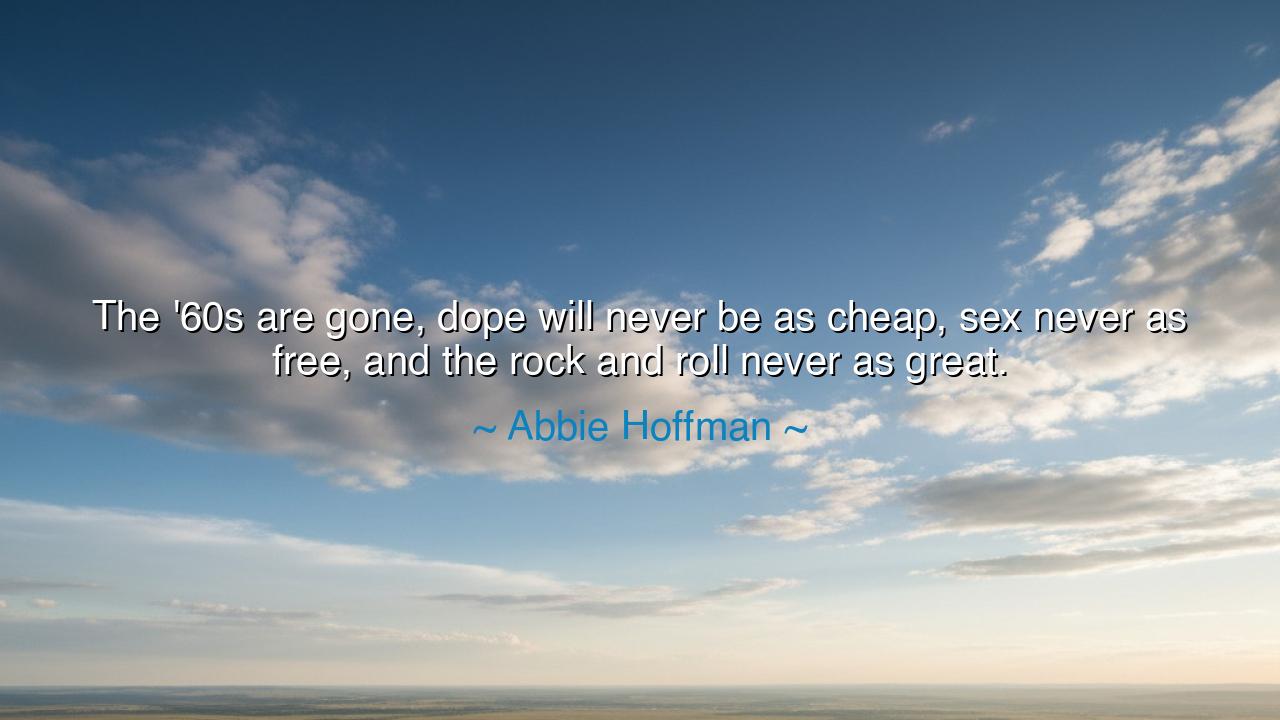
The '60s are gone, dope will never be as cheap, sex never as
The '60s are gone, dope will never be as cheap, sex never as free, and the rock and roll never as great.






“The '60s are gone, dope will never be as cheap, sex never as free, and the rock and roll never as great.” — Abbie Hoffman
In this wistful and fiery reflection, Abbie Hoffman, the radical voice of America’s counterculture, speaks not merely of a vanished decade, but of the passing of an age of innocence and rebellion. His words, tinged with both nostalgia and lament, mark the end of a time when the young dared to dream without restraint — when the world itself seemed malleable under the touch of passion, music, and protest. Hoffman, who lived at the burning heart of the 1960s revolution, saw his generation rise in defiance against conformity, war, and oppression, armed not with weapons, but with music, idealism, and love. Yet he also lived to see that bright flame dimmed — the great ideal reduced to memory, the revolution absorbed by the very system it sought to overturn. His words, then, are not only remembrance, but warning.
When Hoffman declares, “The '60s are gone,” he does not merely note the passage of years — he mourns the fading of a spirit. For the 1960s were not a calendar era; they were an awakening. They were the storm after centuries of silence — a generation rising to demand peace amid war, equality amid division, authenticity amid hypocrisy. The youth of that age dared to believe that the soul of the world could be rewritten through protest, art, and music. But time, relentless and unsparing, carried that spirit away, and with it the wild innocence of its dreams. In Hoffman’s tone, we hear not only sadness, but reverence — for he knew that to live in such a moment was to witness the alchemy of freedom, when humanity briefly remembered its power to change itself.
His mention of “dope,” “sex,” and “rock and roll” are more than symbols of hedonism; they are emblems of liberation. “Dope” — the mind-expanding drug — represented the quest to see beyond the illusions of modern life, to explore consciousness itself. “Sex” stood for the breaking of chains, the rejection of shame and control, and the rediscovery of human intimacy as something sacred and natural. And rock and roll, the great anthem of rebellion, was the heartbeat of the age — the voice of the youth shouting truth to the world that had forgotten how to listen. Each was an act of defiance, a step toward liberation, and together they formed a movement that sought not destruction, but renewal — the rebirth of meaning in a mechanical world.
But Hoffman, ever the realist cloaked in idealism, knew that all golden ages fade. The cheapness of dope, the freedom of love, and the greatness of rock and roll were not the essence, but the expression of something deeper — the hunger for authenticity. As the years passed, commerce devoured the counterculture; what was once rebellion became fashion, what was once sacred became commodity. The youth who once chanted for peace grew into the system they had resisted. And so Hoffman speaks as an ancient would — lamenting the loss not of pleasure, but of purity, of that rare unity between spirit and action that defined his generation.
History has often known such moments — brief seasons when humanity’s heart beats faster, when art and protest and faith merge into one. The Renaissance, the Age of Revolution, the Harlem Renaissance — all were times when beauty and struggle walked hand in hand, and when a people, awakened, sought to remake the world. But such moments are fragile. They burn bright, and then they are gone, leaving only embers to warm those who come after. Hoffman’s lament reminds us that the fire must be tended anew in every generation, or else it will fade into the ash of nostalgia.
And yet, his words carry not only sorrow, but remembrance — the sacred duty of memory. He tells us that even though that era has passed, its light still shines within those who remember what it stood for: freedom, truth, and unity. The youth of today may not have the same anthems or idols, but they carry the same flame — the desire to break the chains of apathy and to live authentically in a world that profits from conformity. Every age must rediscover its own 1960s, its own revolution of the heart, born not of imitation but of courage.
So, O seeker of wisdom, take this teaching into your soul: do not mourn the past as something lost, but honor it as a teacher. The greatness of any age is not bound to its music or its symbols, but to the fire that burned within its people. The ‘60s may be gone, but the spirit that animated them — the defiant belief that art and love can change the world — remains eternal. If you would honor that legacy, live it: question, create, rebel against falsehood, and love without restraint. For every time a new generation dares to awaken, the world is reborn — and in that moment, once again, rock and roll becomes great.






AAdministratorAdministrator
Welcome, honored guests. Please leave a comment, we will respond soon